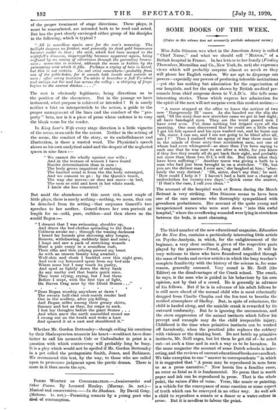The third number of the new educational magazine, Education for
the New Era, contains a particularly interesting little article on Psycho-Analysis, in which, for the enlightenment of the beginner, a very clear outline is given of the respective parts played by the pioneers—Freud, Jung and Adler. It will be very welcome to those who have floundered unguided through the mass of books and review articles in which the busy teacher's complete familiarity with the history of the science is, for some reason, generally assumed. Very sound is Mr. Neill (the Editor) on the disadvantages of the Crank schooL The crank, he says, is the man who is guided in his behaviour by his own opinion, not by that of a crowd. He is generally in advance of his fellows. But if he is in advance of his adult fellows ho is still more ahead of the normal child who is most reluctantly dragged from Charlie Chaplin and the fox-trot to breathe the rarified atmosphere of Shelley. But, in spite of reluctance, the child is hauled along, and the amiable crank is rewarded by its outward conformity. But he is ignoring the unconscious, and the stern suppression of the animal instincts which follow his precept and example may do the child irreparable injury. Childhood is the time when primitive instincts can be worked off harmlessly, when the practical joke replaces the robbery with violence or the drinking bout. Do not bottle up primitive instincts, Mr. Neill urges, but let them be got rid of—be acted out—at such a time and in such a way as to be harmless. In the same magazine the account of some Dutch schools is inter- esting, and the reviews of current educational books are excellent. We take exception to one " answer to correspondents " in which it is suggested that " A poem may be reproduced in note form or as a prose narrative." Now herein lies a familiar error, an error as fatal as it is fundamental. No poem that is worth paper and ink can be reproduced in prose. That is the whole point, the raison d'être of verse. Verse, like music or painting, is a vehicle for the conveyance of some emotion or some aspect of truth which can be conveyed in no other way. As well ask a child to reproduce a sonata or a dance or a water-colour in prose. But it is needless to labour the point.


































 Previous page
Previous page